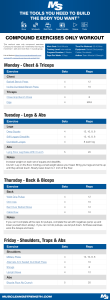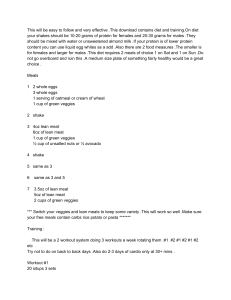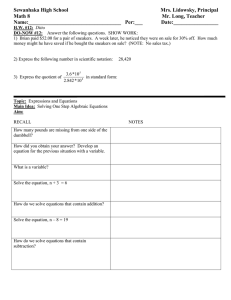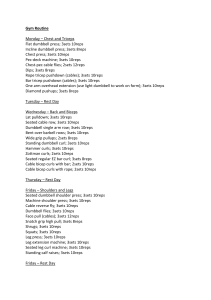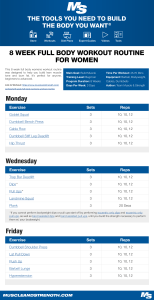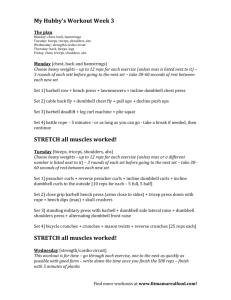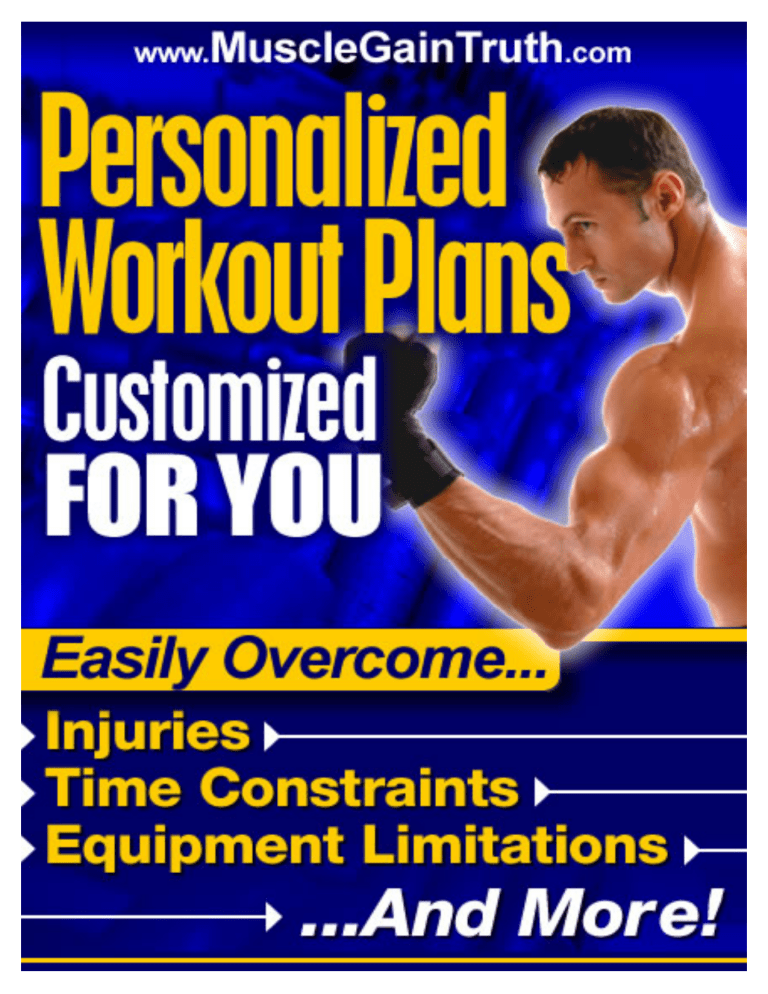
Personalized Workout Plans Customized For Your Needs By Sean Nalewanyj www.SeanNal.com - Important Notice Before beginning any new exercise, nutrition or dietary supplement program you should consult a physician first. The information presented herein is not meant to treat or prevent any disease or to provide the reader with medical advice. If you are looking for specific medical advice then you should obtain this information from a licensed health-care practitioner. This publication is intended for informational use only. Sean Nalewanyj and www.SeanNal.com will not assume any liability or be held responsible for any form of injury, personal loss or illness caused by the utilization of this information. The individual results obtained from the use of this program will vary from person to person and we make no guarantee as to the degree of results that you will personally achieve. ___________________________________________________________________________________________________ © Sean Nalewanyj - All Rights Reserved Page 3 www.SeanNal.com Table of Contents Introduction 5 Physical Limitations 7 Shoulder Injury Level 1 8 Shoulder Injury Level 2 9 Shoulder Injury Level 3 10 Lower Back Injury Level 1 11 Lower Back Injury Level 2 12 Lower Back Injury Level 3 13 Knee Injury 14 Upper Body Only Workout 15 Total Body Injury Workout 16 Time Constraints 18 2-Day Workout A 19 2-Day Workout B 20 4-Day Workout A 22 4-Day Workout B 23 Equipment Limitations 25 Home Workout 27 Exercise Substitutions 28 Conclusion ___________________________________________________________________________________________________ © Sean Nalewanyj - All Rights Reserved Page 4 www.SeanNal.com Introduction Let’s face it; not everyone has the luxury of being able to follow a full-blown muscle-building workout plan right down to the T. From injuries, to equipment limitations, to time constraints, everyone has their own unique situation and this affects what kind of training plan they’re able to implement. Very often we need to make modifications to our workout schedule in order to adapt to our personal limitations. That’s why I created this special report filled with customized training routines in order to meet your specific needs. It’s important to keep in mind that the training routine I’ve outlined in the 26-week workout plan is what I would consider to be ideal, so unless there’s a specific reason why you can’t follow that workout plan, I would suggest sticking to it. I created this report specifically for situations that are beyond your control, and for times when you have no other choice but to make modifications. This report is broken up into 3 main categories of modified routines… 1) Physical Limitations – This section contains workout routines that are customized for different types of injuries that you may be facing. By altering the exercise selection, order and rep ranges you can still get in a safe, effective workout in most situations. 2) Time Limitations – School, work and family can be a fulltime job, and sometimes this can interfere with our workout schedule. In this section I’ll give you some other options by changing the number of days that you train each week. 3) Equipment Limitations – Not everyone is able to join a gym, and many trainees would rather perform their workouts in the comfort of their homes. In this section I’ll outline a stepby-step plan that can be implemented using basic freeweight equipment. Let’s get started! ___________________________________________________________________________________________________ © Sean Nalewanyj - All Rights Reserved Page 5 www.SeanNal.com Physical Limitations ___________________________________________________________________________________________________ © Sean Nalewanyj - All Rights Reserved Page 6 www.SeanNal.com Physical Limitations Through intense weight training, sports and everyday wear-and-tear, a large percentage of us are facing injuries that affect the kind of training that we’re capable of implementing. From lower back problems to shoulder damage to knee pain, often we need to modify our workout plan in order to accompany these injuries. In this section I’m going to outline several routines that take these specific injuries into account. Now, before you do ANYTHING, you should get the problem checked out by a professional. You can’t simply leave the injury alone and hope that it magically heals itself. You should always get a proper diagnosis as soon as possible so that you can take active steps to heal the injury. For the time being, the workout routines in this section will allow you to stimulate your muscles to grow while placing minimal stress on the joints and connective tissues. These routines don’t guarantee anything, and you may find that even while implementing all of the different modifications I’ve made you’re still experiencing pain. If this is the case then you should stop the workout and take time off altogether. You’ll find several different customized routines in this section including those specific to the lower back, shoulders and knees as well as a few others that may be useful. For some of the specific injuries you’ll find varying “levels”. For example, there is a “Shoulder Level 1 Workout”, “Shoulder Level 2 Workout” and “Shoulder Level 3 Workout”. These levels refer to how severe the injury is with “1” being the least severe and “3” being the most severe. You can try implementing different levels to see which routine fits best for you. When viewing the routines, make sure that you understand how to read the sets and reps for each exercise. The first number refers to the number of sets that should be performed while the second group of numbers refers to the rep range. For example, “2 x 5-7” means that you should perform 2 sets of 5 to 7 reps. ___________________________________________________________________________________________________ © Sean Nalewanyj - All Rights Reserved Page 7 www.SeanNal.com Shoulder Injury Level 1 Modifications Made 1) Dumbbell presses replacing all barbell presses – Dumbbells allow for a more natural range of motion as opposed to a barbell which keeps the arms on a fixed plane. 2) Wide-grip dips eliminated – Although a powerful muscle-builder, dips can be quite stressful to the shoulder joints. 3) Standing cable side laterals replacing standing dumbbell side laterals – The cable variation places less stress on the shoulder joint. Try to perform this movement slowly and under great control, using very little to no body momentum. 4) Dumbbell skull crushers replacing ez-bar skull crushers – The dumbbell variation is a more natural movement and therefore places less stress on the shoulder joints. Workout Routine Day1: Legs/Abs Day2: Chest/Shoulders/Triceps Squats – 2 x 5-7 Leg Press – 1 x 5-7 Stiff-Legged Deadlifts – 2 x 5-7 Lying Leg Curls – 1 x 5-7 Standing Machine Calf Raises – 2 x 10-12 Seated Machine Calf Raises – 1 x 5-7 Rope Crunches – 2 x 10-12 Swiss Ball Crunches – 1 x 10-12 Flat Dumbbell Press – 2 x 5-7 Incline Dumbbell press – 2 x 5-7 Decline Dumbbell Press – 2 x 5-7 Seated Overhead Dumbbell Press – 2 x 5-7 Standing Cable Side Laterals – 2 x 10-12 Cable Pushdowns – 2 x 5-7 Dumbbell Skull Crushers – 1 x 5-7 Day3: Back/Biceps/Forearms Deadlifts – 2 x 5-7 Overhand Chin-Ups – 2 x 5-7 Bent Over Barbell Rows – 2 x 5-7 Barbell Shrugs – 2 x 10-12 Barbell Curls – 2 x 5-7 Standing Alternating Dumbbell Curls – 1 x 5-7 Barbell Wrist Curls – 1 x 10-12 ___________________________________________________________________________________________________ © Sean Nalewanyj - All Rights Reserved Page 8 www.SeanNal.com Shoulder Injury Level 2 Modifications Made All modifications from Level 1 Routine plus… 1) Overhead presses removed – Although these are a powerful muscle builder for the shoulders and triceps, you now have no choice but to remove them altogether. 2) V-Bar pulldowns replacing overhand chin-ups – The v-bar variation places less stress on the shoulder joint than traditional overhand freeweight chin-ups. 3) Incline dumbbell presses performed last – Incline dumbbell presses are now moved to the end of the chest workout when strength is at its lowest. The incline press places more stress on the shoulders than the flat or decline variations, and by moving it to the end of the workout your strength will be lower and you won’t be able to handle as much weight. 4) Chest rep ranges increased slightly – Instead of 5 to 7 reps for all pressing movements, you should now increase that to 8 to 10. Lightening up the weights slightly will place less stress on your joints and connective tissues. 5) Decrease the intensity – For your chest pressing movements, you should no longer take your sets to all out muscular failure. Instead, you should train to the point where you believe that you are about 1-2 reps short of failure. (Because the intensity has decreased, a bit of extra volume has been added to the workout) Workout Routine Day1: Legs/Abs Day2: Chest/Shoulders/Triceps Squats – 2 x 5-7 Leg Press – 1 x 5-7 Stiff-Legged Deadlifts – 2 x 5-7 Lying Leg Curls – 1 x 5-7 Standing Machine Calf Raises – 2 x 10-12 Seated Machine Calf Raises – 1 x 5-7 Rope Crunches – 2 x 10-12 Swiss Ball Crunches – 1 x 10-12 Flat Dumbbell Press – 3 x 8-10 Decline Dumbbell Press – 3 x 8-10 Incline Dumbbell Press – 2 x 8-10 Standing Cable Side Laterals – 2 x 10-12 Cable Pushdowns – 2 x 5-7 Dumbbell Skull Crushers – 1 x 5-7 Day3: Back/Biceps/Forearms Deadlifts – 2 x 5-7 V-Bar Pulldowns – 2 x 5-7 Bent Over Barbell Rows – 2 x 5-7 Barbell Shrugs – 2 x 10-12 Barbell Curls – 2 x 5-7 Standing Alternating Dumbbell Curls – 1 x 5-7 Barbell Wrist Curls – 1 x 10-12 ___________________________________________________________________________________________________ © Sean Nalewanyj - All Rights Reserved Page 9 www.SeanNal.com Shoulder Injury Level 3 Modifications Made All modifications from Level 1 & 2 Routines plus… 1) Decline dumbbell press used as core chest movement – The decline angle places the least amount of stress on the shoulder joints and should be used as the main chest exercise. 2) All direct shoulder work eliminated – Side lateral raises have now been removed and the shoulders should not be directly trained at all. 4) Incline Dumbbell presses eliminated – Only flat and decline angles will be used for chest. 5) Rep ranges increased – Rep ranges have further increased from 8-10 up to 12-15 in order to allow for even lighter resistance. 6) Decrease the intensity - Sets should be performed to the point of difficulty, but nowhere near muscular failure. Because the intensity has decreased, more volume has been added to the workout. It is less stressful to perform more sets at a lower intensity than it is to perform fewer sets at a higher level of intensity. Workout Routine Day1: Legs/Abs Day2: Chest/Shoulders/Triceps Squats – 2 x 5-7 Leg Press – 1 x 5-7 Stiff-Legged Deadlifts – 2 x 5-7 Lying Leg Curls – 1 x 5-7 Standing Machine Calf Raises – 2 x 10-12 Seated Machine Calf Raises – 1 x 5-7 Rope Crunches – 2 x 10-12 Swiss Ball Crunches – 1 x 10-12 Decline Dumbbell Press – 3 x 10-15 Flat Dumbbell Press – 3 x 10-15 Flat Smith Machine Press – 3 x 10-15 Cable Pushdowns – 2 x 5-7 Dumbbell Skull Crushers – 2 x 5-7 Day3: Back/Biceps/Forearms Deadlifts – 2 x 5-7 V-Bar Pulldowns – 2 x 5-7 Bent Over Barbell Rows – 2 x 5-7 Barbell Shrugs – 2 x 10-12 Barbell Curls – 2 x 5-7 Standing Alternating Dumbbell Curls – 1 x 5-7 Barbell Wrist Curls – 1 x 10-12 ___________________________________________________________________________________________________ © Sean Nalewanyj - All Rights Reserved Page 10 www.SeanNal.com Lower Back Injury Level 1 Modifications Made 1) Rep ranges increased for core leg movements – Increasing the rep range will allow you to lighten up the weight, and this will place less stress on your lower back. 2) Core leg movements should be performed 1-2 reps short of failure – You should stop performing your squats, deadlifts, leg presses and stiff-legged deadlifts to the point of muscular failure. Perform the set until you feel that you are about 1-2 reps short of hitting failure. 3) Dumbbell lunges replacing the leg press – Dumbbell lunges place a lot less stress on the lower back than the leg press does and should therefore be performed in its place. 4) One-arm dumbbell rows replacing bent over barbell rows – The one-arm dumbbell row allows you to support your lower back by placing one of your knees up on a bench. 5) Dumbbell shrugs to replace barbell shrugs – By holding the dumbbells at your sides (rather than holding a barbell out in front of your body) you’ll place less stress on your lower back. 6) Weightlifting belt can be used if necessary – You can try using a weightlifting belt for your big compound movements that place stress on your lower back: squats, leg press, stiff-legged deadlifts, bent over rows and shrugs. Workout Routine Day1: Legs/Abs Day2: Chest/Shoulders/Triceps Squats – 2 x 12-20 (whichever rep range gives the least amount of stress) Dumbbell Lunges – 1 x 10-12 Stiff-Legged Deadlifts – 2 x 12-15 Lying Leg Curls – 1 x 10-12 Standing Machine Calf Raises – 2 x 10-12 Seated Machine Calf Raises – 1 x 5-7 Rope Crunches – 2 x 10-12 Swiss Ball Crunches – 1 x 10-12 Flat Barbell Press – 2 x 5-7 Incline Dumbbell Press – 2 x 5-7 Wide-Grip Dips – 2 x 5-7 Seated Overhead Dumbbell Press – 2 x 5-7 Standing Dumbbell Side Laterals – 2 x 10-12 Cable Pushdowns – 2 x 5-7 EZ-Bar Skull Crushers – 1 x 5-7 Day3: Back/Biceps/Forearms Deadlifts – 2 x 12-15 Overhand Chin-Ups – 2 x 5-7 One-Arm Dumbbell Rows – 2 x 5-7 Dumbbell Shrugs – 2 x 10-12 Barbell Curls – 2 x 5-7 Standing Alternating Dumbbell Curls – 1 x 5-7 Barbell Wrist Curls – 1 x 10-12 ___________________________________________________________________________________________________ © Sean Nalewanyj - All Rights Reserved Page 11 www.SeanNal.com Lower Back Injury Level 2 Modifications Made All modifications from Level Routine 1, plus… 1) Core leg movements should be performed several reps short of failure – You should be taking your sets to the point of difficulty, but several reps (3-4) short of muscular failure. 2) Stiff-legged deadlifts eliminated – Although a powerful muscle builder, this exercise places quite a bit of stress on the lower back and should therefore be eliminated from the routine. 3) Leg extensions used as a pre-exhaust movement for quads – By pre-exhausting your quads prior to performing your squats you’ll be using less weight overall and this will place the smallest amount of total stress on your lower back. 4) Squat and deadlift volume decreased – Instead of 2 sets of squats and deadlifts, decrease the volume down to just one set. Workout Routine Day1: Legs/Abs Day2: Chest/Shoulders/Triceps Leg Extensions – 2 x 10-12 Squats – 1 x 12-20 (whichever rep range gives the least amount of stress) Dumbbell Lunges – 2 x 10-12 Lying Leg Curls – 2 x 10-12 Standing Machine Calf Raises – 2 x 10-12 Seated Machine Calf Raises – 1 x 5-7 Rope Crunches – 2 x 10-12 Swiss Ball Crunches – 1 x 10-12 Flat Barbell Press – 2 x 5-7 Incline Dumbbell Press – 2 x 5-7 Wide-Grip Dips – 2 x 5-7 Seated Overhead Dumbbell Press – 2 x 5-7 Standing Dumbbell Side Laterals – 2 x 10-12 Cable Pushdowns – 2 x 5-7 EZ-Bar Skull Crushers – 1 x 5-7 Day3: Back/Biceps/Forearms Deadlifts – 1 x 12-15 Overhand Chin-Ups – 2 x 5-7 One-Arm Dumbbell Rows – 2 x 5-7 Dumbbell Shrugs – 2 x 10-12 Barbell Curls – 2 x 5-7 Standing Alternating Dumbbell Curls – 1 x 5-7 Barbell Wrist Curls – 1 x 10-12 ___________________________________________________________________________________________________ © Sean Nalewanyj - All Rights Reserved Page 12 www.SeanNal.com Lower Back Injury Level 3 Modifications Made All modifications from Level 1 & 2 Routines plus… 1) Squats and deadlifts eliminated – These are the 2 most powerful muscle-building exercises in your arsenal, but unfortunately they place a lot of stress on the lower back and should be eliminated altogether. Dumbbell lunges should be replaced as the core leg exercise, and the back workout should be restructured. 2) Lunges should be performed 1-2 reps short of muscular failure – Do not perform your lunges to full concentric muscular failure but rather to the point where you feel that you are 1-2 reps short of failure. 3) Seated cable rows replacing one-arm dumbbell rows – Seated rows place the least amount of stress on the lower back and should therefore replace the dumbbell rows. Workout Routine Day1: Legs/Abs Day2: Chest/Shoulders/Triceps Leg Extensions – 2 x 10-12 Dumbbell Lunges – 2 x 10-12 Lying Leg Curls – 2 x 10-12 Standing Machine Calf Raises – 2 x 10-12 Seated Machine Calf Raises – 1 x 5-7 Rope Crunches – 2 x 10-12 Swiss Ball Crunches – 1 x 10-12 Flat Barbell Press – 2 x 5-7 Incline Dumbbell Press – 2 x 5-7 Wide-Grip Dips – 2 x 5-7 Seated Overhead Dumbbell Press – 2 x 5-7 Standing Dumbbell Side Laterals – 2 x 10-12 Cable Pushdowns – 2 x 5-7 EZ-Bar Skull Crushers – 1 x 5-7 Day3: Back/Biceps/Forearms Overhand Chin-Ups – 3 x 5-7 Seated Cable Rows – 3 x 5-7 Dumbbell Shrugs – 2 x 10-12 Barbell Curls – 2 x 5-7 Standing Alternating Dumbbell Curls – 1 x 5-7 Barbell Wrist Curls – 1 x 10-12 ___________________________________________________________________________________________________ © Sean Nalewanyj - All Rights Reserved Page 13 www.SeanNal.com Knee Injury Knee injuries can be very complicated and can be caused by a large number of different things such as arthritis, damaged cartilage or even a cyst. Instead of writing out customized routines for different levels of knee injuries, I decided to simply layout a “base” routine, and then allow you to make modifications to that routine based on your personal situation. Here is the ideal base routine, and below it you can find some recommended modifications laid out in the progressive order that you should make them. Workout Routine Day1: Legs/Abs Day2: Chest/Shoulders/Triceps Squats – 2 x 5-7 Leg Press – 1 x 5-7 Stiff-Legged Deadlifts – 2 x 5-7 Lying Leg Curls – 1 x 5-7 Standing Machine Calf Raises – 2 x 10-12 Seated Machine Calf Raises – 1 x 5-7 Rope Crunches – 2 x 10-12 Swiss Ball Crunches – 1 x 10-12 Flat Barbell Press – 2 x 5-7 Incline Dumbbell press – 2 x 5-7 Wide-Grip Dips – 2 x 5-7 Seated Overhead Dumbbell Press – 2 x 5-7 Standing Dumbbell Laterals – 2 x 10-12 Cable Pushdowns – 2 x 5-7 Dumbbell Skull Crushers – 1 x 5-7 Day3: Back/Biceps/Forearms Deadlifts – 2 x 5-7 Overhand Chin-Ups – 2 x 5-7 Bent Over Barbell Rows – 2 x 5-7 Barbell Shrugs – 2 x 10-12 Barbell Curls – 2 x 5-7 Standing Alternating Dumbbell Curls – 1 x 5-7 Barbell Wrist Curls – 1 x 10-12 Recommended Modifications 1) Increase rep ranges for core leg movements/deadlifts – Instead of performing heavy sets in the 5-7 rep range, you should lighten up the weight and perform higher rep sets in the range of 12-20 depending on what is most comfortable for you. You should do this for any exercises that you cause you discomfort. 2) Decrease the intensity – Stop performing your sets to muscular failure, and instead perform your sets at the highest level of intensity that you can without stressing your knees heavily. 3) Eliminate exercises that cause discomfort – If your knee pain is posing a big problem, the next best thing is to simply eliminate all exercises that are causing you pain. You can find appropriate substitutions at the end of this manual. ___________________________________________________________________________________________________ © Sean Nalewanyj - All Rights Reserved Page 14 www.SeanNal.com Upper Body Only This is a specific “upper body only” routine that I put together for those that absolutely cannot train their legs. This routine should not be used as an excuse to neglect your lower body; it has been included for those that truly and honestly have no choice but to train their upper body only. You’ll notice that there is optional calf work included with the Day1 workout. If you’re capable of training calves then you should include these in your routine. Day1: Back Overhand Chin-Ups – 2 x 5-7 One-Arm Dumbbell Rows – 2 x 5-7 V-Bar Pulldowns – 2 x 5-7 Seated Cable Rows – 2 x 5-7 Dumbbell Shrugs – 2 x 10-12 **Standing Machine Calf Raises – 2 x 10-12 **Seated Machine Calf Raises – 1 x 5-7 Day2: Chest/Abs Flat Barbell Bench Press – 2 x 5-7 Incline Dumbbell Press – 2 x 5-7 Wide-Grip Dips – 2 x 5-7 Rope Crunches – 2 x 10-12 Swiss Ball Crunches – 2 x 10-12 Day3: Shoulders/Biceps/Triceps Seated Overhead Dumbbell Press – 2 x 5-7 Standing Dumbbell Side Laterals – 2 x 10-12 Cable Pushdowns – 2 x 5-7 Barbell Curls – 2 x 5-7 EZ-Bar Skull Crushers – 2 x 5-7 Standing Alternating Dumbbell Curls – 2 x 5-7 ___________________________________________________________________________________________________ © Sean Nalewanyj - All Rights Reserved Page 15 www.SeanNal.com Total-Body Injury Workout This routine has been put together for those that simply cannot follow the traditional heavy and intense routines that I typically recommend. If you have a history of joint problems and are simply looking for a routine that can help you to get into the gym and stay in shape (but not necessarily maximize your muscle and strength gains) then the following routine can help you to achieve that without placing undo stress on your joints and connective tissues. The intensity that you choose to perform this workout at is completely up to you and depends on your personal situation. Your goal should be to perform it with the highest level of intensity that you can while keeping joint discomfort at a minimum. Day1: Legs/Abs Dumbbell Lunges – 3 x 10-12 Lying Leg Curls – 3 x 10-12 Standing Machine Calf Raises – 2 x 12-15 Seated Machine Calf Raises – 2 x 10-12 Rope Crunches – 2 x 10-12 Swiss Ball Crunches – 2 x 15 Day2: Chest/Shoulders/Triceps Flat Dumbbell Press – 3 x 10-12 Incline Dumbbell Press – 3 x 10-12 Decline Dumbbell Press – 3 x 10-12 Seated Overhead Dumbbell Press – 2 x 10-12 Standing Cable Side Laterals – 2 x 10-12 Cable Pushdowns – 2 x 10-12 Dumbbell Skull Crushers – 2 x 10-12 Day3: Back/Biceps/Forearms Lat Pulldowns – 3 x 10-12 One-Arm Dumbbell Rows – 3 x 10-12 V-Bar Pulldowns – 2 x 10-12 Seated Cable Rows – 2 x 10-12 Barbell Curls – 2 x 10-12 Standing Alternating Dumbbell Curls – 2 x 10-12 Barbell Wrist Curls – 2 x 10-12 ___________________________________________________________________________________________________ © Sean Nalewanyj - All Rights Reserved Page 16 www.SeanNal.com Time Constraints ___________________________________________________________________________________________________ © Sean Nalewanyj - All Rights Reserved Page 17 www.SeanNal.com Time Constraint Workouts As far as I’m concerned, 3 weight training workouts per week is ideal for stimulating maximum muscle growth and allowing for optimal recovery time in between training sessions. Unless there is a specific reason why you can’t find time to execute the 3 weekly workouts outlined in the 26-week workout plan, then I’d suggest sticking to that schedule. With the proper planning and dedication, I feel that anyone should be able to squeeze in 3 weekly workouts regardless of their situation. Whether this means changing the time that you train, switching to a home-based workout or simply getting more serious about your training program, 3 workouts per week is not too much to ask in most situations. However, if you honestly and truly cannot squeeze 3 workouts into your schedule no matter what, then the 2-day per week routines outlined in this section are the next best thing. I’ve included 2 different schedules, and I would encourage you try both in order to see which works best for you. You’ll have to keep two things in mind in regards to these routines… a) They don’t follow the traditional guidelines outlined in my e-book – With only 2 workouts per week, it’s impossible to implement all of the regular guidelines that I recommend. The number of sets per exercise, the body part groupings and the frequency all have to change in order to accommodate the new schedule. b) These workouts are highly demanding – Since you’ll only be training twice per week, this means that you’ll be training more muscle groups on each given day. The more muscle groups you train, the more stress you place on your body, and you’ll find that these routines really do take a lot out of you. So in short, be prepared! ___________________________________________________________________________________________________ © Sean Nalewanyj - All Rights Reserved Page 18 www.SeanNal.com 2-Day Workout (A) This routine follows the concept of full-body workouts. Each workout is based around 3 major compound lifts to begin the session, followed by 4 supplementary exercises in order to make sure that the entire body is stimulated. You should perform a full weight acclimation warmup for the first major exercise, and then 23 quick and easy warmup sets for the 2nd and 3rd exercise. After that you can motor through the rest of the workout. Day1 Squats – 2 x 5-7 Seated Overhead Dumbbell Press – 2 x 5-7 Overhand Chin-Ups – 2 x 5-7 Standing Dumbbell Side Laterals – 1 x 10-12 Cable Pushdowns – 2 x 5-7 Standing Machine Calf Raises – 2 x 10-12 Stiff-Legged Deadlifts – 1 x 5-7 Day2: Rest Day3: Rest Day4: Rest Day5 Deadlifts – 2 x 5-7 Incline Dumbbell Press – 2 x 5-7 Bent Over Barbell Rows – 2 x 5-7 Rope Crunches – 2 x 10-12 Barbell Shrugs – 1 x 10-12 Barbell Curls – 2 x 5-7 Farmers Walks x 1 Day6: Rest Day7: Rest ___________________________________________________________________________________________________ © Sean Nalewanyj - All Rights Reserved Page 19 www.SeanNal.com 2-Day Workout (B) This routine is based on the split of “legs/arms/abs” and “chest/back/shoulders”. On Day1, You should perform a full weight acclimation warmup for the squats, and 2-3 quick and easy warmup sets for each arm movement. On Day2, You should perform a full weight acclimation warmup for both the deadlifts and the incline dumbbell press. I would suggest performing the warm-ups simultaneously by alternating back and forth between each exercise as this will save time once the actual workout begins. Day1 Squats – 2 x 5-7 Leg Press – 1 x 5-7 Stiff-Legged Deadlifts – 2 x 5-7 Standing Machine Calf Raises – 1 x 10-12 Seated Machine Calf Raises – 1 x 5-7 Rope Crunches – 1 x 10-12 Swiss Ball Crunches – 1 x 10-12 Barbell Curls – 2 x 5-7 Cable Pushdowns – 2 x 5-7 Day2: Rest Day3: Rest Day4: Rest Day5 Deadlifts – 2 x 5-7 Incline Dumbbell Press – 2 x 5-7 Overhand Chin-Ups – 2 x 5-7 Wide-Grip Dips – 2 x 5-7 Bent Over Barbell Rows – 2 x 5-7 Seated Overhead Dumbbell Press – 2 x 5-7 Standing Dumbbell Side Laterals – 1 x 10-12 Day6: Rest Day7: Rest ___________________________________________________________________________________________________ © Sean Nalewanyj - All Rights Reserved Page 20 www.SeanNal.com Additional Workouts I was a bit hesitant to post these additional workouts since we all know that I’m a huge advocate of low volume, infrequent routines. As long as you train with full intensity and effort on each and every workout, I really don’t feel that it’s necessary to be in the gym anymore than 3 days per week. But that being said, I wanted to provide you with as many options as possible, and so I’ve gone ahead and included 2 other “4 day” per week routines. There are two situations and two situations only where you may want to implement one of these 4 day schedules… 1) You’re an experienced lifter – If you’ve been training for a couple of years now and you want to get a bit more flexible with your schedule and try something new, a 4 day a week routine might be a reasonable option to try out. 2) You have “better then average” genetics – If you don’t consider yourself a “hardgainer” and you find that you can naturally pack on muscle at a fairly quick pace, then you probably have a fairly quick recovery rate as well. For this reason, you might be able to get away with trying out a 4 day per week routine to see how your body responds. If you don’t fit into either of those two categories, then I would strongly urge you to stick with the traditional 3-day per week routines. 4-day per week routines result in more “overlap” throughout the week (stimulation of the same muscle groups more than once) and are more stressful to the entire body as a whole. If you do fit one of those descriptions, here are a couple of 4-day per week routines that you might want to try out… ___________________________________________________________________________________________________ © Sean Nalewanyj - All Rights Reserved Page 21 www.SeanNal.com 4-Day Workout (A) Day1: Back/Forearms Day2: Chest/Calves Deadlifts – 2 x 5-7 Overhand Chin-Ups – 2 x 5-7 Bent Over Barbell Rows – 2 x 5-7 Barbell Shrugs – 2 x 10-12 Barbell Wrist Curls – 1 x 10-12 Farmers Walks x 1 Flat Barbell Bench Press – 2 x 5-7 Incline Dumbbell Press – 2 x 5-7 Wide-Grip Dips – 2 x 5-7 Standing Machine Calf Raises – 2 x 10-12 Seated Machine Calf Raises – 2 x 5-7 Day3: Rest Day4: Thighs/Abs Day5: Shoulders/Biceps/Triceps Squats – 2 x 5-7 Leg Press – 2 x 5-7 Stiff-Legged Deadlifts – 2 x 5-7 Leg Curls – 1 x 5-7 Rope Crunches – 2 x 10-12 Swiss Ball Crunches – 2 x 10-12 Seated Overhead Dumbbell Press – 2 x 5-7 Standing Dumbbell Side Laterals – 2 x 10-12 Barbell Curls – 2 x 5-7 Cable Pushdowns – 2 x 5-7 Standing Dumbbell Curls – 1 x 5-7 EZ-Bar Skull Crushers – 1 x 5-7 Day6: Rest Day7: Rest ___________________________________________________________________________________________________ © Sean Nalewanyj - All Rights Reserved Page 22 www.SeanNal.com 4-Day Workout (B) Day1: Thighs/Abs Day2: Chest/Triceps Squats – 2 x 5-7 Leg Press – 2 x 5-7 SLDL – 2 x 5-7 Leg Curls – 1 x 5-7 Rope Crunches – 2 x 10-12 Swiss Ball Crunches – 2 x 10-12 Flat Barbell Bench Press – 2 x 5-7 Incline Dumbbell Press – 2 x 5-7 Wide-Grip Dips – 2 x 5-7 Cable Pushdowns – 2 x 5-7 EZ-Bar Skull Crushers – 1 x 5-7 Day3: Rest Day4: Lats/Biceps Day5: Traps/Shoulders/Forearms Overhand Chin-Ups – 2 x 5-7 Bent Over Barbell Rows – 2 x 5-7 V-Bar Pulldowns – 1 x 5-7 Seated Cable Rows – 1 x 5-7 Barbell Curls – 2 x 5-7 Standing Dumbbell Curls – 1 x 5-7 Deadlifts – 2 x 5-7 Seated Overhead Dumbbell Press – 2 x 5-7 Standing Dumbbell Side Laterals – 2 x 10-12 Barbell Shrugs – 2 x 10-12 Barbell Wrist Curls – 1 x 10-12 Farmers Walks x 1 Day6: Rest Day7: Rest ___________________________________________________________________________________________________ © Sean Nalewanyj - All Rights Reserved Page 23 www.SeanNal.com Equipment Limitations ___________________________________________________________________________________________________ © Sean Nalewanyj - All Rights Reserved Page 24 www.SeanNal.com Introduction If you think that you need to join a gym in order to see significant muscle-building results, think again! If you’d prefer to train from the comfort of your home, you most definitely can as long as you have the right equipment. There are 5 pieces of equipment that you’ll need in order to get the most out of your home workout… 1) A barbell and weight plates – This should go without saying. A barbell is the most basic piece of equipment you can get, and must be included in your routine. 2) Adjustable dumbbells – Again, dumbbells are a staple part of any effective musclebuilding routine. If you cannot afford a full set of dumbbells, you’d be best to purchase those that are adjustable and allow you to manually change the weights on and off. 3) A bench – You’ll need this to perform your bench presses and you should ideally purchase a bench that has an incline adjustment. 4) A squat rack – You’ll either need to purchase a regular power rack, or some other kind of apparatus that allows you to squat safely. The bottom line is that you need a piece of equipment that allows you to unrack a loaded bar, and return that bar to the rack safely at the end of the set. In addition, there should be a system in place that allows you to “bail” in case you reach muscular failure during the set. This could mean resting the bar on a set of safety pins (which are found in a power rack) or dropping the bar off of your back onto the floor. 5) A chin-up bar – You can purchase chin-up bars at most sports equipment stores. They sell for a cheap price and can fit inside of a doorframe. ___________________________________________________________________________________________________ © Sean Nalewanyj - All Rights Reserved Page 25 www.SeanNal.com In addition, you must make sure that you have enough weight to allow for steady upward progression in weight on a consistent basis. As you know, the entire basis for building muscle is to continually add more weight to the bar over time, and if you don’t have enough weights to allow for this you’ll be dead in the water. If you have all 5 of these pieces of equipment covered (and enough weight to allow for continued progression) then you can certainly see equal muscle-building results training from home. On the following page I’m going to outline what I would consider to be the “ideal” home workout. If there are certain exercises that you can’t perform due to equipment limitations, then please refer to the next page, as I’ll go through point for point and outline common problems that you might face and how to solve them. ___________________________________________________________________________________________________ © Sean Nalewanyj - All Rights Reserved Page 26 www.SeanNal.com Ideal Home Workout Day1: Legs/Abs Squats – 2 x 5-7 Barbell or Dumbbell Lunges – 1 x 5-7 Stiff-Legged Deadlifts – 2 x 5-7 Standing One-Legged Dumbbell Calf Raises – 2 x 10-12 Seated Barbell Calf Raises – 1 x 5-7 Weighted Situps or Crunches – 2 x 10-12 Weighted Leg Raises – 1 x 10-12 Day2: Chest/Shoulders/Triceps Flat Barbell Press – 2 x 5-7 Incline Dumbbell Press – 2 x 5-7 Wide-Grip Dips – 2 x 5-7 Seated Overhead Dumbbell Press – 2 x 5-7 Standing Dumbbell Side Laterals – 1 x 10-12 EZ-Bar Skull Crushers – 2 x 5-7 Overhead Dumbbell Extensions – 1 x 5-7 Day3: Back/Biceps/Forearms Deadlifts – 2 x 5-7 Overhand Chin-Ups – 2 x 5-7 Bent Over Barbell Rows – 2 x 5-7 Barbell Shrugs – 2 x 10-12 Barbell Curls – 2 x 5-7 Standing Alternating Dumbbell Curls – 1 x 5-7 Barbell Wrist Curls – 1 x 10-12 ___________________________________________________________________________________________________ © Sean Nalewanyj - All Rights Reserved Page 27 www.SeanNal.com Home Workout Modifications Please read below, as I’m going to go through each individual workout and outline some common obstacles that you might face and how to overcome them. Day1: Legs/Abs - If you don’t have a squat rack – get one! This is a critical muscle-building exercise and must be included in your routine if you want to see the best possible results. If this is completely impossible, then your thigh workout should look like this… Barbell or Dumbbell Lunges – 3 x 5-7 Stiff-Legged Deadlifts – 2 x 5-7 This is the only real obstacle that I can see for this workout. Day2: Chest/Shoulders/Triceps - Many of you who are training from home won’t have the luxury of a spotter for your bench presses. If this is the case, then you’ll need to switch to dumbbell presses. Training to failure is a critical aspect of this program, and you absolutely should NEVER perform a barbell press without a spotter as this is extremely dangerous. If you don’t have a spotter, replace the flat barbell bench press with a flat dumbbell press. - If you don’t have a dip stand, you can try using the back of 2 sturdy chairs to perform your dips. Make sure that the chairs can easily withstand the weight and that there is no risk of them collapsing. If this isn’t possible, then the next best option is to replace the dips with a decline barbell or dumbbell press. If you don’t have a decline angle on your bench, then any other basic barbell or dumbbell press (flat or incline) can be subbed in. ___________________________________________________________________________________________________ © Sean Nalewanyj - All Rights Reserved Page 28 www.SeanNal.com If you don’t have a spotter and dumbbells are your only option, then your chest workout should look like this: Flat dumbbell press – 3 x 5-7 Incline dumbbell press – 3 x 5-7 - If you don’t have an EZ-Curl bar for your skull crushers, you can either use a basic straight bar or dumbbells instead. Day3: Back/Biceps/Forearms - The only possible issue for this workout is in regards to the chin-ups. If you aren’t able to purchase a chin-up bar and have no other apparatus that allows you to perform this exercise (in addition, you do not have access to a lat pulldown machine), then you’ll simply have to substitute in another basic rowing movement. Bent over dumbbell rows or one-arm dumbbell rows will be the proper substitution. Your back workout should then look like this: Deadlifts – 2 x 5-7 Bent over barbell rows – 2 x 5-7 Bent over dumbbell rows OR one-arm dumbbell rows – 2 x 5-7 + The rest of the workout as normal ___________________________________________________________________________________________________ © Sean Nalewanyj - All Rights Reserved Page 29 www.SeanNal.com Exercise Substitutions In this section I’m going to outline appropriate substitutions for some common exercises that you’ll find in the routines. Squats – Leg Press, Barbell Lunges, Dumbbell Lunges Leg Press – Barbell Lunges, Dumbbell Lunges Stiff-Legged Deadlifts – Good Mornings, Lying Leg Curls, Seated Leg Curls Lying Leg Curls – Seated Leg Curls, Good Mornings Standing Machine Calf Raises – Standing One-Legged Dumbbell Calf Raises, Standing Barbell Calf Raises Seated Machine Calf Raises – Seated Barbell Calf Raises, Leg Press Calf Raises Rope Crunches – Weighted Situps, Weighted Crunches Swiss Ball Crunches – Decline Weighted Situps, Weighted Crunches, Weighted Leg Raises Flat Barbell Bench Press – Flat Dumbbell Press (Ultimately any basic flat or decline press using barbells or dumbbells is fine) Wide-Grip Dips – Decline Barbell Press, Decline Dumbbell Press (Ultimately any basic flat or decline press using barbells or dumbbells is fine here as well) Cable Pushdowns – EZ-Bar Skull Crushers, Dumbbell Skull Crushers, Overhead Dumbbell Extensions, Overhead EZ-Bar Curl Extensions, Close-Grip Bench Presses, Narrow-Grip Dips EZ-Bar Skull Crushers – Cable Pushdowns, Dumbbell Skull Crushers, Overhead Dumbbell Extensions, Overhead EZ-Bar Curl Extensions, Close-Grip Bench Presses, Narrow-Grip Dips Deadlifts – There really is no direct substitute for deadlifts. If you are unable to perform deadlifts, please refer to one of the restructured back routines from the injury section of this report. Overhand Chin-Ups – Overhand Lat Pulldowns, Underhand Lat Pulldowns, Bent Over Dumbbell Rows, OneArm Dumbbell Rows ___________________________________________________________________________________________________ © Sean Nalewanyj - All Rights Reserved Page 30 www.SeanNal.com Conclusion If you have a specific limitation such as an injury, lack of equipment, time constraint or some other matter, then hopefully you found an appropriate workout in this report in order to suit your needs. I tried to provide as many different solutions as possible so that no one would be left in the dark or be confused about what modifications to make to their routine. If after reading this report you still haven’t found an appropriate solution, then you’ll probably need a customized routine created specifically for you. If you’re a Gold member and are still within your 3-month one-on-one consultation period, simply send me an email and I can personally create a routine just for you. If you aren’t a Gold member or if your consultation period expired, visit the members area for information on how to upgrade. All the best with your training efforts, ___________________________________________________________________________________________________ © Sean Nalewanyj - All Rights Reserved Page 31 www.SeanNal.com
